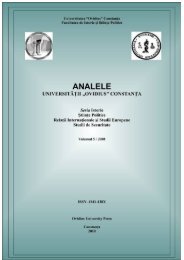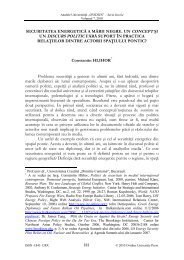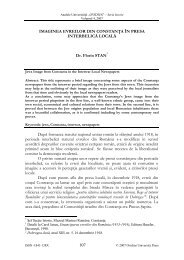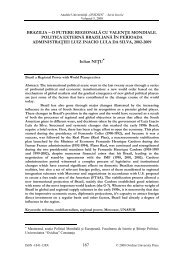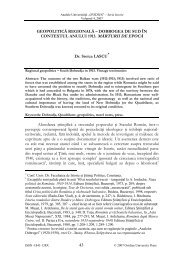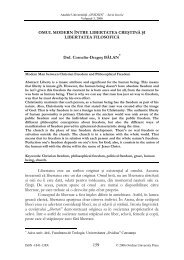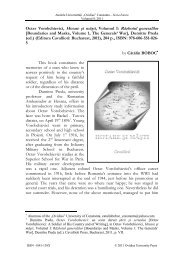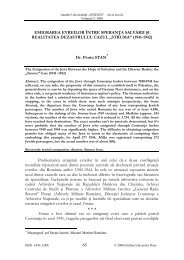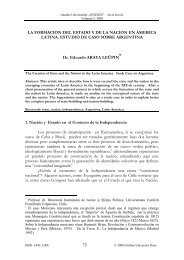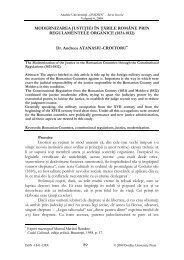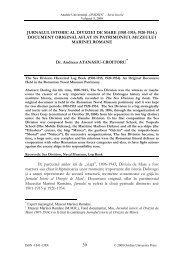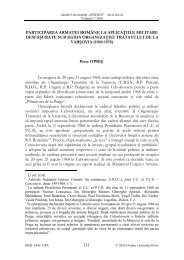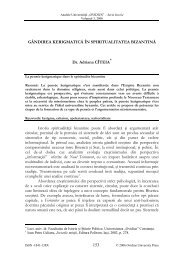analele universitÄÅ£ii âovidiusâ constanÅ£a - AUOCSI
analele universitÄÅ£ii âovidiusâ constanÅ£a - AUOCSI
analele universitÄÅ£ii âovidiusâ constanÅ£a - AUOCSI
You also want an ePaper? Increase the reach of your titles
YUMPU automatically turns print PDFs into web optimized ePapers that Google loves.
Confronting the Future. The Balkans. A Systematic, Comparative Retrospection<br />
Analele Universităţii „OVIDIUS” / Vol. 6/ 2009<br />
Given the internal challenges and external linkages of the Balkans<br />
region, strategic trajectories have been conceived. Given the diverse and often<br />
taunting interests of the various actors involved, business as usual may be the most<br />
likely policy outcome. This carries with it numerous risks, however. A more<br />
proactive policy that seeks to shape, rather than simply react to, events in the<br />
region would involve enhanced engagement, including a clearly formulated plan<br />
and timetable for the accession of Western Balkan states into the EU (i.e.<br />
European Neighborhood Policy) 12 . It is tantalizing to ponder upon the idea of<br />
integration of all states of the region in NATO, and preferably in the European<br />
Union as well as the key to lasting stability in the Western Balkans. Indeed, in<br />
their quest for stability and abundance, all these states seek a NATO connection<br />
and aspire to EU accession 13 . Furthermore, Prof. Dr. Mitja Žagar 14 , from the<br />
Institute for Ethnic Studies, in Ljubljana, states that regional reconciliation is<br />
declared an important element of “normalization” in “postconflict societies” 15 .<br />
However, this apparently well-thought statement is in need of some illustration<br />
and elucidation – possibly also rethinking of concepts, policies and strategies.<br />
Founder of the Eastern European Department (1986) at the Center for<br />
Strategic and International Studies (CSIS) in Washington, Janusz Bugajski states<br />
in a recent study, entitled Facing The Future: The Balkans To The Year 2010, that<br />
since the collapse of communist Europe, the “Balkans” had once again captured<br />
the headlines in the American and West European media and the attention of<br />
foreign policy makers. The concept of “Balkanisation”, following the<br />
disintegration of the Soviet Bloc and the collapse of the communist Yugoslav<br />
federation, had again entered the security vocabulary 16 .<br />
It had come to represent, much as it did at the beginning of this century,<br />
a desabilitating chaos of conflict and instability that no outside power could<br />
control and no local power could evidently escape. The crisis in the Balkans had<br />
seriously tested NATO’s cohesion during its evolution from a system of<br />
collective defense to a structure of pan- European security. The Kosovo<br />
problem had a direct impact on two questions that are vital to long-term<br />
Bianca Jinga, A Comment on Democracy and Security in the Western Balkans, pp. 59-61,<br />
accessed November 20, 2009, at:<br />
http://www.dgap.org/midcom.../2009_umschl_nfc_prag_www.pdf.<br />
12 I. Kempe, K. Klotzle, op. cit., pp. 5-6.<br />
13 Ibidem.<br />
14 Mitja Zagar is Senior Reseach Fellow and Director of the Institute for Ethnic Studies and<br />
at the Faculty of Social Sciences at the Univesity of Ljubliana;<br />
15 Mitja Zagar, The Future EU South-Eastern Enlargement, at the National Centre for<br />
Research on Europe, September 2007, pp. 1-3, accessed: November, 22, 2009, at:<br />
http://www.europe.canterbury.ac.nz/news/2007_news/SloveniaFlyer.pdf.<br />
16 Archive of the European Integration: Facing the Future: The Balkans to the Year 2010 by<br />
Janusz Bugajski, pp. 5-7, accessed: November, 22, 2009, at:<br />
http://www.zei.de/download/zei_dp/dp_c86_bugajski.pdf.<br />
ISSN -1841-138X 81 © 2009 Ovidius University Press



